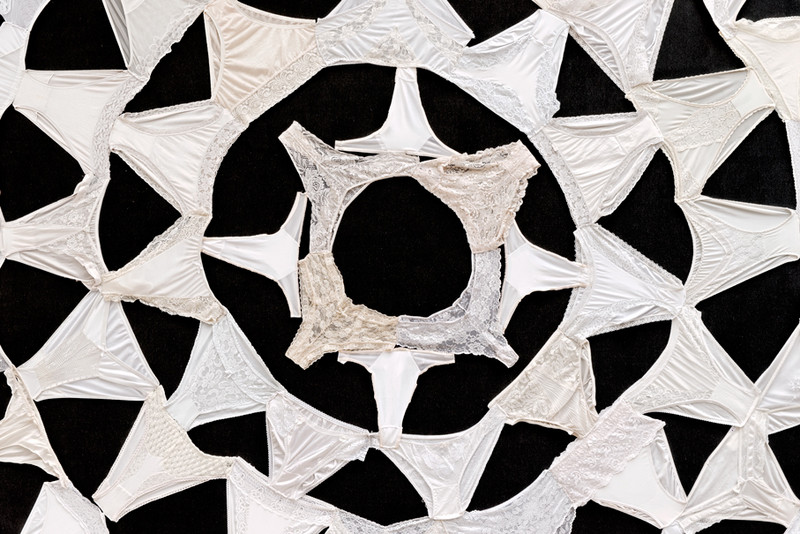Pilar Albarracin
08 Jun - 31 Jul 2012

Mandala (white) - detail, 2012
Women underwear on canvas, metallic frame
unique piece
108 1/4 x 108 1/4 x 1 1/8 in.
© Aurélien Mole
Women underwear on canvas, metallic frame
unique piece
108 1/4 x 108 1/4 x 1 1/8 in.
© Aurélien Mole
PILAR ALBARRACIN
El origen del nuevo mundo
8 June - 31 July 2012
Gustave Courbet painted The Origin of the World as a universal representation of desire, revealing the topography of female eroticism rising towards the mound of Venus with previously unheard-of artistic realism. Equally capable of triggering acclaim and outrage, his picture made the act of looking (or concealing) no small matter.
As most feminists see it, exposure of the female genitalia prompts either rejection or desire in its reversal of the norm of what must not be seen. This is why many artists have repeatedly used depiction of the vagina and the vulva as a gesture of social transgression or transformation. Pilar Albarracín breaks with this triangulation of our desires in her focus on panties, those intimate everyday items that conceal our sex organs, just as numerous other pictures have screened The Origin of the World. In her creation of a new origin – a new world – she generates a range of fine-drawn consequences: filling a space with panties disturbs, and alters our way of seeing; and women who speak of their panties are breaking the «deepest privacy» taboo in a fresh statement of what they are and what they have worn. Each woman’s panties have a social and individual history, and here, emancipated from an imposed vision of sexuality, they reclaim their right to artistic recycling. In this elevation to the level of art and aspiration to the sacred, these panty-mandalas define a new cosmology freed of the pain of women’s loneliness and physical isolation. Defying the myth of the universal woman, they reflect feminine diversity – diversity of bodies, tastes, decisions – in a circularity that goes counter to the parted line of the vulva. The colours revolt against gender dichotomy, with each shape and each choice of chromatic range conjuring up an anonymous experience of desires assuaged or forgotten. The endless spiral of El origen del nuevo mundo (The Origin of the New World) is to be found no longer on the surface of things, but in the depths of the infinite.
The transition from the everyday to the sacred – where the visible and the invisible are no longer eroticised – disrupts the accepted continuity between the upward gaze and the meaning of the signifier. Albarracín’s mandalas bring unity to what is observed and the multiplicity of its parts. It is not only the inherent value of the object that moves us, but the accumulation of implied experiences over time. These panties needed to be sorted and categorised, then turned into apposite compositions.
Last but not least, the fact that they are sewn highlights another of Pilar Albarracín’s stances: the assertion of sewing and embroidery as feminine technologies.
based on a text by Assumpta Sabuco i Cantó
El origen del nuevo mundo
8 June - 31 July 2012
Gustave Courbet painted The Origin of the World as a universal representation of desire, revealing the topography of female eroticism rising towards the mound of Venus with previously unheard-of artistic realism. Equally capable of triggering acclaim and outrage, his picture made the act of looking (or concealing) no small matter.
As most feminists see it, exposure of the female genitalia prompts either rejection or desire in its reversal of the norm of what must not be seen. This is why many artists have repeatedly used depiction of the vagina and the vulva as a gesture of social transgression or transformation. Pilar Albarracín breaks with this triangulation of our desires in her focus on panties, those intimate everyday items that conceal our sex organs, just as numerous other pictures have screened The Origin of the World. In her creation of a new origin – a new world – she generates a range of fine-drawn consequences: filling a space with panties disturbs, and alters our way of seeing; and women who speak of their panties are breaking the «deepest privacy» taboo in a fresh statement of what they are and what they have worn. Each woman’s panties have a social and individual history, and here, emancipated from an imposed vision of sexuality, they reclaim their right to artistic recycling. In this elevation to the level of art and aspiration to the sacred, these panty-mandalas define a new cosmology freed of the pain of women’s loneliness and physical isolation. Defying the myth of the universal woman, they reflect feminine diversity – diversity of bodies, tastes, decisions – in a circularity that goes counter to the parted line of the vulva. The colours revolt against gender dichotomy, with each shape and each choice of chromatic range conjuring up an anonymous experience of desires assuaged or forgotten. The endless spiral of El origen del nuevo mundo (The Origin of the New World) is to be found no longer on the surface of things, but in the depths of the infinite.
The transition from the everyday to the sacred – where the visible and the invisible are no longer eroticised – disrupts the accepted continuity between the upward gaze and the meaning of the signifier. Albarracín’s mandalas bring unity to what is observed and the multiplicity of its parts. It is not only the inherent value of the object that moves us, but the accumulation of implied experiences over time. These panties needed to be sorted and categorised, then turned into apposite compositions.
Last but not least, the fact that they are sewn highlights another of Pilar Albarracín’s stances: the assertion of sewing and embroidery as feminine technologies.
based on a text by Assumpta Sabuco i Cantó
